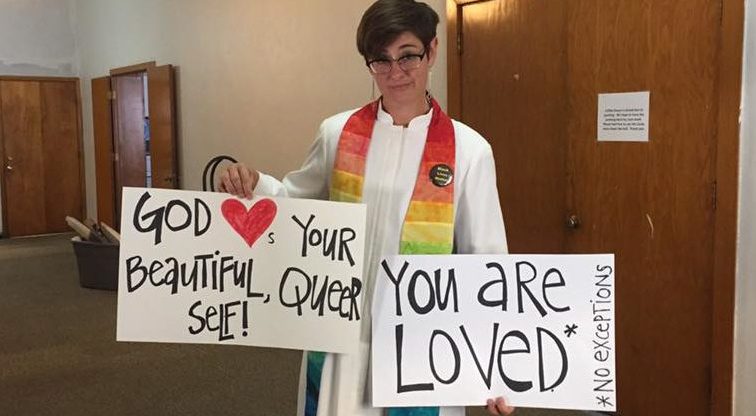Queer pastor on leave without compensation for being a ‘practicing homosexual’

Anna Blaedel, the queer pastor on indefinite leave after being accused of being a “practicing homosexual”. (Anna Blaedel/ Facebook)
A Methodist queer pastor has been forced to take a leave of absence to avoid a church trial after they were accused of being a “self-avowed practicing homosexual”.
Pastor Anna Blaedel of the United Methodist Church (UMC), who uses they/them pronouns, has been accused three times of the “offence” and has been fighting charges for three years.
According to the UMC’s Book of Discipline, the offence of being a “self-avowed practicing homosexual” is defined as when “a person openly acknowledges to a bishop, district superintendent, district committee of ordained ministry, board of ordained ministry, or clergy session that the person is a practicing homosexual”.
It is in the same list of offences as sexual abuse, child abuse and racism.
Accused of violating UMC doctrine, Blaedel agreed to a settlement on Wednesday (November 13) to go on an “indefinite leave of absence” to avoid going through a church trial.
According to The Gazette, the resolution stated that Blaedel could use the absence for “personal healing, and for discerning a livable future and alternatives to remaining a member of the Iowa Conference and The United Methodist Church — the conference and denomination to which Rev. Blaedel was called, ordained, and appointed, but which seems to hold no future for them and their ministry.”
They will be allowed to work between 10 and 15 as leader of the Table Tuesday program at the University of Iowa, where students come together to discuss faith and social justice, but will otherwise receive no pay.
In an open letter published in The Gazette, the queer pastor wrote: “One of the greatest gifts of these last three and a half years of harmful charges and destructive complaints has been the ongoing opportunity to dive deep into the practice of telling the truth.
“Truths about the holy delights of queerness, and the sacred beauty of transness. About the urgent needs for intersectional justice and collective liberation.
“About the need to escalate our resistance when violence escalates… About how there can be no queer justice without racial justice without ecological justice without economic justice without gender justice without disability justice, because our lives are complex and entangled and none of us is free until all of us are free, and if our comfort is coming at the cost of another’s survival sitting with discomfort is far holier than retreating into denial.”
“I was born into a denomination that declares that my very being and loving is incompatible with Christian teaching. I was called into ordained ministry in a denomination and a conference that I thought might never ordain me, but did…. The truth is: I had hoped more would be possible.
“This resolution is not just. None of this is ok. And, I believe, I have done, we have done, what I, what we, can.”
Earlier this year at the United Methodist General Conference delegates voted against an inclusive “One Church” proposal that would have allowed local congregations to decide on whether to allow same-sex weddings and LGBT+ clergy themselves.

